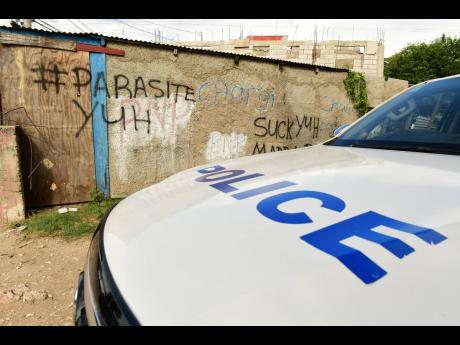Peter Espeut | A final solution for gangs
Speaking in Gordon House on May 19, 2020, Minister of National Security Dr Horace Chang revealed that according to the National Intelligence Bureau (NIB) of the Jamaica Constabulary Force, there were some 389 criminal gangs operating in this little island up to the end of 2019. He was presenting the report of the Joint Select Committee on the Criminal Justice (Suppression of Criminal Organisations) Act, more commonly referred to as the “Anti-Gang Legislation”, and he asserted that criminal gangs presented a “clear and present danger” to Jamaican society.
The NIB had identified 66 Jamaican gangs with centralised leadership and international connections who were involved in extortion, money laundering, drug smuggling, and gun running. Several communities in Kingston, St Andrew, St Catherine, Clarendon and St James are controlled by criminal gangs, and some residents may turn out in support of them.
The most famous gangs that have operated in Jamaica have had more than casual connections with the Jamaica Labour Party and the People’s National Party. There have long been allegations that honourable members of parliament have provided guns and ammunition to their supporters to defend political turf, but Jamaican law enforcement and the justice system has not been able to bring any to book. In fact, so far, arrests and convictions have been restricted to street-level small fry in gangs associated with whichever party is not in power; the several “Mr Bigs” behind the gangs seem untouchable.
Which is why over the years in this column I have called for outside investigators from organisations like the FBI and Scotland Yard to be invited to clean up our house, since we seem unable (or unwilling) to do so.
Of course, this will never happen, as long as the foxes are guarding our henhouse.
I view with a huge amount of scepticism the expectation that a force of Jamaican policemen – even assisted by armed forces from elsewhere – can clear up Haiti’s gang problem. Gangs in Haiti are united and powerful, and seem to have openly taken over parts of the capital, Port-au-Prince, and occupy public facilities like the ports. In some ways Haiti is more advanced than we are.
LINKS between countries
The fact that there are links between Jamaican gangs and Haiti is well known; the long-standing guns-for-drugs trade between the two countries is evidence of this.
Some years ago I was sitting in a sidewalk café in Les Cayes on Haiti’s south coast enjoying curried lambi (conch) nwhen I was greeted with “Whappen, Brudder Pete! What you doing here?” I didn’t need to ask what my fisherman friend from Jamaica’s south coast was doing there!
I have been to Haiti by boat; it takes only a few hours to make the crossing. I am surprised that more Haitian boats do not land on our shores; the sea currents and wind favour their journey!
What approach will our Jamaican troops take to deal with the gangs in Haiti? Surely they will not be proposing Haitian “Anti-Gang Legislation”?
Recently, the favourite anti-gang strategy used by the Jamaican security forces has been states of emergency/zones of special operations, with the scraping up of visible persons on the street. Our government has been trying to amend the bail act to be able to hold persons for long periods without charge and without bail in “preventative detention”; I am reminded of the “indefinite detention” of previous years.
Is that what our forces will be doing in Haiti in our name?
Over the decades the Jamaican security forces have built up a reputation for excessive use of force, and extrajudicial killings; just consult the reports on Jamaica put out by Amnesty International over the last 40 years. Kicking down of doors became a standard practice, as well as the beatings of “suspects”.
Is that what our forces will be doing in Haiti in our name? I hope not!
MIDWIFED armed gangs
Economic and social conditions in Jamaica and our toxic political system midwifed armed gangs. A non-performing education system makes social mobility for the disadvantaged unlikely to impossible. If all criminal gunmen and women in Jamaica were eliminated today, a new crop would emerge overnight. The strategies we have been employing cannot solve the problem of Jamaican gangs.
If our security forces cannot deal with Jamaica’s gangs, in a space where they know the culture and speak the language, how will they deal with Haitian gangs? I am thinking of the unfortunate case of Keith Clarke. A claim of “mistaken identity” suggests that some feel it would have been OK if it was the right person.
Is someone going to indemnify our security forces in Haiti against whatever they might do?
I fear that Jamaica’s reputation may be tarnished by this adventure in Haiti by our security forces. I worry about the men who will return to Jamaica after this campaign with the experience they will have gained.
And I worry about our young men who will return to Jamaica in body bags. Will their lives have been spent in vain?
I don’t know what benefit the government can gain from this expedition in an election year. I think we should buckle down and seek a solution to our own gang problem which has so far eluded us. The “clear and present danger” to our well-being is before our eyes!
Peter Espeut is a sociologist and development scientist. Send feedback to columns@gleanerjm.com

